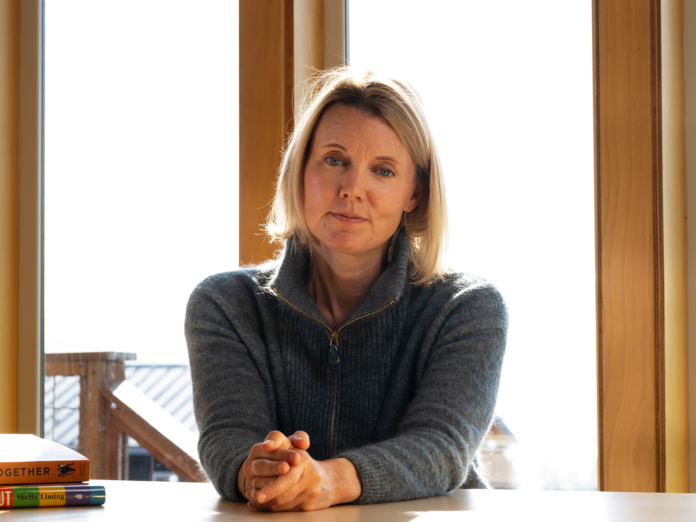[ad_1]
In 2021, author Anne Helen Petersen made a daring determination: She and her associate determined to maneuver from Montana to Lummi Island, a nine-square-mile piece of land off the coast of Washington State solely accessible by ferry. Certain, the situation was fairly distant, and the closest big-box grocery retailer was a ship experience away. However the cause for her transfer was what raised a number of eyebrows: Petersen relocated so she might reside close to her greatest good friend. Two extra associates adopted go well with and purchased properties close by quickly after. “I’m the least lonely I’ve been in a very long time in my grownup life, which is an attention-grabbing factor to say while you reside on an island of 900 full-time residents,” she says now.
Due to that transfer, the subject of friendship has begun to pop up increasingly more in her uber-popular Substack e-newsletter, Culture Study, which has greater than 200,000 subscribers, plus a associated podcast. It covers subjects that mirror Petersen’s pursuits and each day life, together with pop-culture evaluation, productiveness, and something which may fall below the umbrella of “tradition.” A former educational with a PhD in media research, Petersen grew to become identified on-line for her multi-thousand-word options on subjects like millennial burnout and the cool-girl phenomenon, and has additionally written books protecting the power of remote work and the “can’t even” generation.
However as Petersen started to prioritize friendship increasingly more in her actual life, she couldn’t cease fascinated about what we lose by not making these relationships a pivotal a part of our lives. “I am a private essayist at coronary heart, and what is going on on in my very own life all the time influences what I am writing and fascinated about within the e-newsletter,” she says.
In November 2023, Petersen printed a chunk referred to as “The Friendship Dip,” discussing a new survey1 that discovered folks of their 30s and 40s have fewer shut associates than folks of their 60s. “The way in which our society is organized, we’ve got a protracted stretch of maturity that’s not conducive to forging or sustaining friendship or group,” Petersen wrote. “In lots of instances, I’d say it’s truly hostile to it.” The Friendship Dip, as she calls it, is the stage in life the place household {and professional} obligations take precedence over social calendars, finally contributing to deep and pervasive loneliness.
“
There’s a willingness to be weak [online] that could be a lot tougher in actual life.
—Anne Helen Petersen
Petersen went via her personal dip when she lived in New York Metropolis, away from her shut associates, within the 2010s. “Individuals already had their good friend teams, so I retreated to the thought of, ‘I’ll work on a regular basis,’” she says. However as she discovered, “work will not be a satisfying greatest good friend.” After shifting to Montana, Petersen discovered some good associates, however not “the sentiments of house” she now feels on Lummi Island close to her outdated associates. On the time, she discovered herself pondering, “I have already got these extremely robust friendships, so what if I—an individual who did not have youngsters—simply moved to the place my associates had been?”
After all, dwelling close to your pals isn’t an computerized remedy for loneliness, as Petersen is fast to acknowledge; the sensation can take maintain even while you’re surrounded by folks. “Emotions of loneliness occur since you don’t like your self, otherwise you haven’t carried out the work of attempting to essentially look after or nourish your self,” she says. “It’s a mix of remedy and giving your self time to be with your self and determine what you love to do and domesticate solitude.” Additionally, she admits, discovering reference to your self could be exhausting. “It’s important to really feel uncomfortable,” she says. “It’s important to override the a part of you that wishes to take the trail of least resistance.”
On account of her curiosity in good friend assist programs, Petersen not too long ago introduced she’s engaged on a brand new ebook, Pal Group: A Survival Information for the Loneliest Century, which can goal to rethink friendship in at this time’s world. Tapping into her reader base, she’s begun to ask subscribers for their very own tales of loneliness, connection, and friendship, from “cultivating intergenerational group” with folks exterior of your loved ones, to shifting again to your hometown and determining “what group appears like now.”
For a lot of, a web based group could also be their solely group.
What may look like a scream into the Web void has truly been a siren music for Petersen, who has developed deeply loyal subscribers who frequently go away a whole bunch—if not 1000’s—of lengthy, in-depth feedback on every of her Tradition Research posts. “The readership is a number of nerds who’ve some nostalgia for a unique form of Web, like The Hairpin or The Toast period,” Petersen says, referencing now-shuttered information, tradition, and humor web sites of the 2010s, the place the feedback sections had their very own devoted followings.
As with Tradition Research, these women-led web sites allowed for area of interest communities to flourish with anonymity and, usually, vulnerability. Suppose full-on conversations, debates, and inside jokes with folks you’ve by no means met earlier than, however would develop to work together with on a near-daily foundation. “Individuals like speaking about esoteric stuff in a approach that is empathetic, nerdy, and inquisitive,” says Petersen, noting that her subscribers—or “nerds”—are usually “commenting in good religion.” Which is important, contemplating these subscribers go away not solely a whole bunch of feedback on her posts, but additionally replies to these feedback, and replies to the replies of these feedback, leading to disagreement, fervor, assist, and debate.
“There’s a starvation for witty engagement with strangers,” Petersen says. “My tagline is ‘don’t be butts about this.’ We would like this to be a spot the place persons are in dialog, and you might be taking part. Your engagement, your willingness to ask questions, to self-interrogate, to acknowledge the way you may’ve harm or misinterpreted somebody—that’s all a part of it.” Primarily, the identical tips you’re anticipated to observe inside your real-life circles, since for a lot of, a web based group could also be their solely group.
It’s in these conversations that readers discover assist and camaraderie to speak about subjects which might be tougher to broach in on a regular basis life, like conversations about cash, or make associates in maturity. On most Fridays, Petersen can even pose questions and let readers pontificate. Prompts like “What’s retaining us out of others’ enterprise?” and “Inform different folks about your work” get north of 500 feedback. Ebook, clothes, TV, and cooking “concierge” threads asking for suggestions get greater than 1,000. “There’s a willingness to be weak that could be a lot tougher in actual life,” Petersen says.
In a current Tradition Research submit titled “Reimagining Life with Friendship at the Center,” commenters left e mail addresses for each other to attach off-thread, shared recommendation for cultivating friendships (“Pal anniversary journeys is such an excellent concept!”), and even debated how vital friendship actually is, regardless of it being your complete matter of the submit. In response to somebody who described themselves as not being a “good friend individual,” Petersen wrote, “Simply wish to say I actually respect your willingness to strategy one thing that does not mirror your personal expertise as an object of curiosity, [rather than] one thing that is bizarre or offensive. Feedback like yours assist make these feedback sections actually, effectively, attention-grabbing.”
On account of the vulnerability, honesty, and good-faith discourse, real-life connections have come from the group, identical to they may in another on-line discussion board. “Somebody emailed me the opposite day to say that that they had requested for Paris journey suggestions in a Tradition Research thread. They emailed forwards and backwards, after which ended up hanging out with the one that gave them the suggestions once they went to Paris,” says Petersen. “They despatched me an image.”
Nicely+Good articles reference scientific, dependable, current, sturdy research to again up the knowledge we share. You’ll be able to belief us alongside your wellness journey.
-
Parker, Kim, and Rachel Minkin. “Public Has Combined Views on the Fashionable American Household.” Pew Analysis Middle’s Social & Demographic Developments Challenge, 14 Sept. 2023, www.pewresearch.org/social-trends/2023/09/14/public-has-mixed-views-on-the-modern-american-family/.
[ad_2]
Source link







